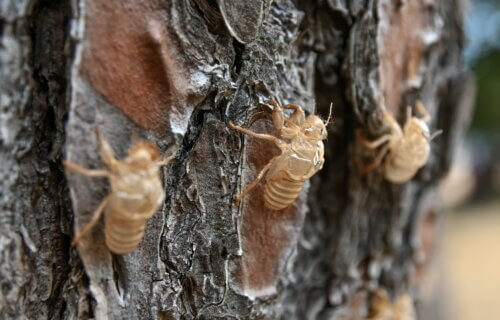ST. LOUIS — Do you remember those cringe-worthy moments from the television show “Fear Factor” where contestants ate crunchy insects to compete for cash? Research has long shown that eating certain bugs can actually benefit our health. Now it turns out that munching away on those crispy exoskeleton shells left behind by insects like cicadas are pretty beneficial too!
According to a study conducted on mice by Washington University School of Medicine in St. Louis, digesting chitin – a major dietary fiber component found in insect exoskeletons as well as in mushrooms and crustacean shells – can positively impact metabolism.
In a rodent study, scientists learned that when mice digested chitin, their immune system became engaged. This response was linked to decreased weight gain, lower body fat, and even resistance to obesity.
“Obesity is an epidemic,” says study lead author Dr. Steven Van Dyken, an assistant professor of pathology & immunology, in a university release. “What we put into our bodies has a profound effect on our physiology and on how we metabolize food. We’re investigating ways to counteract obesity based on what we learn about how the immune system is engaged by diet.”
When the stomach expands after consuming chitin, an innate immune response is activated. This encourages the stomach to produce chitinases, enzymes specialized in breaking down chitin. It’s worth noting that chitin doesn’t dissolve in liquid and needs enzymes and a highly acidic environment to be digested.

The study also revealed that this digestion process could take place even without the presence of gut bacteria. Study first author Dr. Do-Hyun Kim, a postdoctoral research associate, executed the experiments on germ-free mice, demonstrating that the immune responses were activated by chitin even in the absence of these bacteria.
“We think chitin digestion mainly relies on the host’s own chitinases,” explains Dr. Van Dyken. “The stomach cells change their enzymatic output through a process we refer to as adaptation. But it is surprising that this process is happening without microbial input, because bacteria in the gastrointestinal tract are also sources of chitinases that degrade chitin.”
Researchers identified that chitin’s most significant anti-obesity effects in mice came into play when the immune system was activated but the chitin wasn’t digested. Mice on a high-fat diet, when also fed with chitin they couldn’t digest due to a lack of chitinases, showed less weight gain and lower body fat compared to their counterparts.
For mice capable of breaking down chitin, there were still metabolic benefits, although they adjusted by overproducing chitinases to extract nutrients from chitin.
Dr. Van Dyken is now eager to explore the implications of these findings on humans. The aim is to see if incorporating chitin into our diet could help regulate obesity. “We have several ways to inhibit stomach chitinases,” he notes. “Pairing those approaches with a chitin-containing food might have a very real metabolic benefit.”
The study is published in the journal Science.
